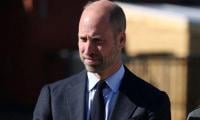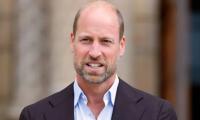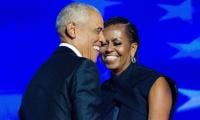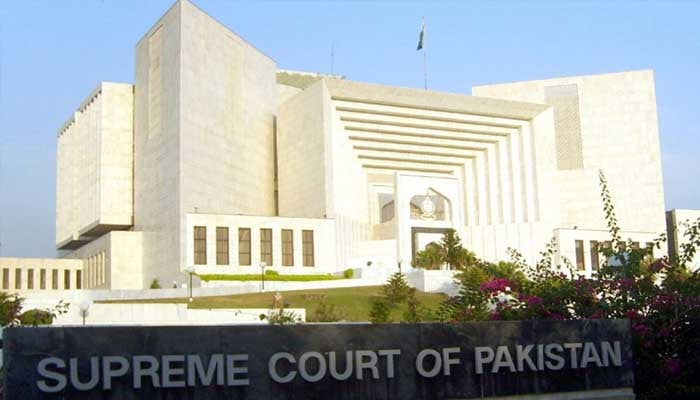SCBA plea against lifetime ban: Nawaz, Tareen, Musharraf, others to benefit from judgment
ISLAMABAD: Deposed Prime Minister Nawaz Sharif, disgruntled Pakistan Tehreek-e-Insaf (PTI) leader Jahangir Tareen and former President Pervez Musharraf are among several politicians who will be principal beneficiaries if the Supreme Court invalidates the lifetime ban on them to contest elections.
The Supreme Court Bar Association (SCBA) has filed a petition in the apex court to seek the cancellation of the perennial disqualification, and its president Ahsan Bhoon has raised the question: can a lifetime bar be read into Article 62(1)(f) of the Constitution when its plain language does not stipulate as much?
Days after his election, he had announced to challenge the bar. The new Chief Justice of Pakistan, Justice Umar Ata Bandial, will take up the petition for disposal. Article 62(1)(f) says a person shall not be qualified to be elected or chosen as a member of parliament unless he is “sagacious, righteous, non-profligate, honest and ameen”, there being no declaration to the contrary by a court of law.
Apart from the high profile Nawaz Sharif, Tareen and Musharraf, dozens of others who were disqualified by the Supreme Court for holding fake degrees, will also benefit from a favourable judgment on the SCBA plea.
Nawaz Sharif and Tareen were disqualified for life in 2017 while the Peshawar High Court (PHC) had imposed such a ban on Musharraf in 2013. However, on an appeal filed by the Pakistan Muslim League-Nawaz (PMLN) leader Khawaja Asif against his disqualification imposed by the Islamabad High Court (IHC) on a petition of PTI stalwart Usman Dar, the Supreme Court held in 2018 that the element of bad intention with regard to an undeclared asset had to exist before it was described as dishonest; intervention through a quo warranto [a writ or legal action requiring a person to show by what warrant an office or franchise is held, claimed, or exercised] in financial matters against an elected member could only be justified when non-disclosure of an asset was meant to conceal a wrongdoing; and law did not envisage that every rejection of nomination papers on account of non-disclosure of an asset would lead to disqualification under Article 62(1)(f). Therefore, unless some wrongdoings or dishonesty associated with an undeclared asset was established the outcome of the case would not culminate into disqualificatio for life.
The PHC had ruled that all unconstitutional and illegal actions taken by Musharraf at the time of imposing a second emergency remained invalid because they were not validated by the parliament; he was guilty of subverting the Constitution and completely demolished the superior judiciary, which was an important limb of the State; subversion of the Constitution, as committed by him, was an act which was punishable under Article 62, and under the High Treason (Punishment) Act, 1973 and he was likely to earn the penalty of death; all actions taken by him at the time of imposing second emergency in 2007 and thereafter attracted un-condonable disqualification for him for all times to come because the quantum and magnitude of disqualification earned through his unconstitutional and illegal acts, was continuous, sustained and recurring and not for one time; and he had earned a lifetime disqualification for contesting elections for parliament, provincial assemblies, Senate or any public office nor he was qualified and eligible to hold any other public office of any representative character.
In April 2018, a five-member bench of the Supreme Court had held that anyone hit by Article 62(1)(f) will be disqualified for life to stand in elections. The panel was headed by then Chief Justice Saqib Nisar and comprised Justice Bandial, Justice Ijazul Ahsan, Justice Sajjad Ali Shah, and Justice Azmat Saeed Sheikh (since retired). Justice Bandial had authored the 52-page verdict, which was supported by three judges while Justice Azmat Saeed Sheikh had not agreed with the reasoning of the majority ruling.
The verdict had also negated the views of its two amicus curiae, Syed Ali Zafar [now a PTI senator] and Muneer A Malik. It had also rejected the contentions of (late) Asma Jahangir, who had opposed lifelong disqualification.
The judgment had come as another setback for Nawaz Sharif, who was first disqualified as the prime minister/member of the National Assembly and later declared ineligible to head his party. Consequently, Tareen had also stood permanently ineligible.
The judgment had justified the permanent disqualification of MPs and comprehensively discussed the importance of Article 62 (1)(f) placing its reliance on Article 2A of Constitution and verses of the Holy Quran. Article 2A says the principles and provisions set out in the Objectives Resolution are made substantive part of the Constitution and shall have effect accordingly.
The ruling said the absence of a time limit for the ineligibility of a candidate for election in Article 62(1)(f) is the basis for holding his incapacity to be incurable by efflux of time.
The SCBA petition quoted a number of judgments in support of its contention. It said that excessively punitive and restraining interpretation of Article 62(1)(f) deprives potential candidates of their right to contest elections and form a government even after the rectifications have been modeled.
It submitted with particular reference to the proceedings under Article 184(3) that no right of appeal is afforded to a person against whom a declaration is given by the apex court. It has consistently been held by the Supreme Court that one right of appeal is intrinsic to access to justice. With no right of appeal, a person against whom a declaration under Article 184(3) is given is left with no adequate remedy to vindicate himself.
The plea said the Supreme Court, acting pursuant to Article 184(3), exercises extraordinary and original constitutional jurisdiction. It does not act as a trial court where the person against whom a declaration under Article 62(1)(f) being sought is afforded the right to lead evidence, produce witnesses, cross-examine the other side’s witnesses and so on.
It said an equally plausible reading of Article 62(1)(f) could be that not meeting any of the conditions/qualifications stipulated in this provision would only render the person ineligible for the time being, or for a particular election or office under challenge. It can also be argued that where disqualification is time-bound, the Constitution states so i.e. in Article 63. It is settled principle of interpretation that where the import of some enactment is inconclusive or ambiguous, the court may properly lean in favour of an interpretation that safeguards the rights of an individual. Where no limitation period is specified by the Constitution itself, language cannot be read into it.
The petition said there is no mention of disqualification being permanent or indefinite under Article 62(1)(f), hence, the same cannot be presumed. The legislative intent behind insertion of “there being no declaration to the contrary by a court of law” in Article 62(1)(f) vide the 18th amendment of 2010, appears to build a safeguard against abuse of this provision. Prior to the insertion of this language, the returning officers, in summary proceedings, were applying this provision to knock the candidates out of the election process, on the objections of the rival candidates. If the parliament intended to give perpetuity to a declaration under Article 62(1)(f), it would have stated so by inserting specific language to this effect. It is thus submitted that the court has incorrectly read lifetime disqualification into Article 62(1)(f).
For the disqualification to attain permanence, the declaration by a court of law referred to in Article 62(1)(f) must be given after the recording of evidence and cannot be given in summary or inquisitorial proceedings, the petition said.
-
 Vertical Tabs Coming To Google Chrome
Vertical Tabs Coming To Google Chrome -
 Jane Seymour Reveals THIS Beloved Romance Was 'worst-reviewed' Movie Ever
Jane Seymour Reveals THIS Beloved Romance Was 'worst-reviewed' Movie Ever -
 European Leaders Slam Trump’s Tariff Threat Over Greenland As ‘unacceptable’
European Leaders Slam Trump’s Tariff Threat Over Greenland As ‘unacceptable’ -
 Princess Eugenie Leaves Father Andrew 'devastated' With Big Step: 't's Brooklyn Beckham Level'
Princess Eugenie Leaves Father Andrew 'devastated' With Big Step: 't's Brooklyn Beckham Level' -
 Nova Scotia Snow Storm Warning Issued As Heavy Snow Moves In
Nova Scotia Snow Storm Warning Issued As Heavy Snow Moves In -
 Vancouver Canucks 2025-26 Season: Adam Foote’s Future Under Early Scrutiny
Vancouver Canucks 2025-26 Season: Adam Foote’s Future Under Early Scrutiny -
 Gabriel Diallo Vs Alexander Zverev: Rising Canadian Eyes Major Upset Opportunity
Gabriel Diallo Vs Alexander Zverev: Rising Canadian Eyes Major Upset Opportunity -
 Bo Nix Injury Update: Broncos Quarterback Fractures Ankle Against Bills
Bo Nix Injury Update: Broncos Quarterback Fractures Ankle Against Bills -
 Oilers Vs Canucks: Why Edmonton Is Without Leon Draisaitl
Oilers Vs Canucks: Why Edmonton Is Without Leon Draisaitl -
 49ers Crushed As Kenneth Walker III Leads Seahawks To 41-6 Win
49ers Crushed As Kenneth Walker III Leads Seahawks To 41-6 Win -
 Canadiens Star Lane Hutson Makes History With 100th NHL Assist
Canadiens Star Lane Hutson Makes History With 100th NHL Assist -
 Bridgerton’s Claudia Jessie Says Her Real-life Style Is Nothing Like Eloise’s
Bridgerton’s Claudia Jessie Says Her Real-life Style Is Nothing Like Eloise’s -
 Prince William Barred From Riding E-scooter At His Own Home!
Prince William Barred From Riding E-scooter At His Own Home! -
 Prince William New PR Step Is Not 'shrewed Move,' Says Expert
Prince William New PR Step Is Not 'shrewed Move,' Says Expert -
 Barack Obama Honours Michelle Obama On Her 62nd Birthday
Barack Obama Honours Michelle Obama On Her 62nd Birthday -
 Why Kate Middleton Runs Away From 'some Royal Relatives'
Why Kate Middleton Runs Away From 'some Royal Relatives'




